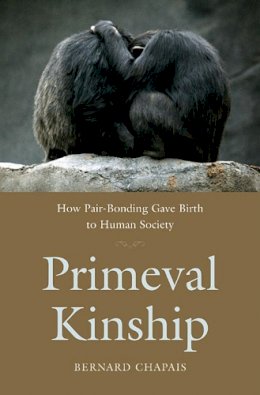
Primeval Kinship: How Pair-Bonding Gave Birth to Human Society
Bernard Chapais
At some point in the course of evolution—from a primeval social organization of early hominids—all human societies, past and present, would emerge. In this account of the dawn of human society, Bernard Chapais shows that our knowledge about kinship and society in nonhuman primates supports, and informs, ideas first put forward by the distinguished social anthropologist, Claude Lévi-Strauss.
Chapais contends that only a few evolutionary steps were required to bridge the gap between the kinship structures of our closest relatives—chimpanzees and bonobos—and the human kinship configuration. The pivotal event, the author proposes, was the evolution of sexual alliances. Pair-bonding transformed a social organization loosely based on kinship into one exhibiting the strong hold of kinship and affinity. The implication is that the gap between chimpanzee societies and pre-linguistic hominid societies is narrower than we might think.
Many books on kinship have been written by social anthropologists, but Primeval Kinship is the first book dedicated to the evolutionary origins of human kinship. And perhaps equally important, it is the first book to suggest that the study of kinship and social organization can provide a link between social and biological anthropology.
Product Details
About Bernard Chapais
Reviews for Primeval Kinship: How Pair-Bonding Gave Birth to Human Society
Monique Borgerhoff Mulder
Nature
Chapais has written a bold, new book that promises nothing less than the unveiling of the original, earliest form of human society and an account of how it developed over evolutionary time. The book indeed fulfills this promise, presenting a persuasive, well-argued, logical evolutionary scenario based on empirical data and a sound comparative method… Primeval Kinship presents powerful arguments concerning the origin and evolutionary path of human kinship. It reopens old questions, long abandoned, about the origins of human society, and addresses them with a brilliant synthesis of recent primate data. Chapais has demonstrated that primatology is now positioned to make significant contributions to the study of human kinship. This work will undoubtedly open further debate and inspire further research. It effectively dispels the view that human kinship is a purely cultural construction or that kinship can be understood outside the framework of our primate legacy.
Linda Stone
Evolutionary Psychology
Primeval Kinship represents a bold effort to integrate two wildly disparate disciplines, primatology and cultural anthropology, to understand long-standing questions about the evolution of human society. With an increasing tendency toward specialization in science, there are few who dare step outside of their comfort zones to attempt broad, wide-ranging syntheses on problems that go to the heart of what it is to be human. In this regard, Chapais should be lauded for his labors and for an extremely stimulating read. His reasoned and careful treatment of the primate data provides considerable food for thought about how and why we have come to be the way we are.
John C. Mitani
Primates
Primeval Kinship is a treasure chest of comparative research on human and primate social structure, organization, and behavior. This book will reignite and reinvigorate discussions of the evolution of primate and human society. It will be a model from which future social and physical anthropologists, primatologists, and social scientists can build.
Robert Wald Sussman, Professor of Anthropology and Environmental Sciences, Washington University in St. Louis
